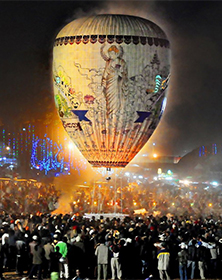Festivals
Taunggyi Tazaungdaing Festival
- Details
- Hits: 4750
 Tazaungdaing
Tazaungdaing
Photo Credit - www.myanmartourserviceagency.com/
Lights festival again.!
It's lights and festivals with a vengeance. since the monsoon months come to an end. Close upon Thadingyut festival comes the Tazaungdaing with more lights and festivities. Many households leave the decorations and lanterns on so that they do not have to put them up again in three weeks' time.
We all know that people hang out lighted lanterns in honour of the anniversary of the Buddha's descent from the celestials region. But why again the illuminations in the following month?
I used to think that some people wished to go on with the celebration as the Thadingyut festivities are often spoilt by rain. It is hardly so. although I strongly suspect that to be the reason with most of the merrymaking folk. This festival seems to date back to preBuddhist days.
A folk festival
Tazaungdaing festival is. in fact. called Kattika feast. We find many references in the Jatakas. the. Buddha's birth stories. This month is supposed to be the time thieves ply their trade; astrologers say that certain signs of the Zodiac are in the ascendant so that many people's thoughts are bent on mischief.
It is said that kings declared feasts to be held so that all the jollity and merry-making would take the people's minds away from mischief. a kind of psychological warfare.
It is the wont of the youths to steal things like flower-pots and clothes and pile them at the cross roads. In small towns and villages. where the people know one another. this is done in the spirit of fun.
Whole nights. young men go about stealing women's skirt which they hoist at the top of the pole. Sign boards would be put at the door of privies. In the morning. everyone has a goodlaugh. No serious harms is done and no one is offended. Of course it is different in cities where people are not so close to one another and such things are done more in mischief and even malice.
Illuminations are more elaborate than in Thadingyut. Jataka stories lend romantic and sometimes diverting touches to the celebrations. If you go down the lighted streets you may find a tableau or play in progress. a young maiden. resplendent in jewels. throwing flowers at a magnificently dressed regal person on a chariot.
Stories represented in tableaux
This is a story of a maid named Ummadanti. whose name itself is synonymous with dazzling beauty. She was born of a rich and noble family. One day. the king sent fortune-tellers to read the lineaments of her body. so that he might marry her.
The fotune-tellers. on seeing her. became so intoxicated by her beauty that they made a mess of the food offered to them. Ashamed of their own behaviour. they made a false report to the' king that she was not fit to be the queen.
Ummadanti was given in marriage to the king's general. She never forgot the slight and with the rage of a woman scorned. she waited to take her revenge.
On the day of the Kattika festival. the whole city was illuminated and adorned. The king. in his royal splendour. was to ride the streets on the full moon day. The general. before he left home to go on his duty to guard the city on the occasion said to his wife: "My dear. tonight the king will ride through the city and he will come to our door. Please do not show yourself for he will not be able to control his thoughts."
Fury of a woman scorned
Ummadanti made a noncommittal reply. As soon as her maid. in obedience to her order. came and informed her that the king's chariot had come to the door. the lady went to the open window.
From the strategic position. the beautiful Ummadanti threw flowers at the king. When he turned his eyes to her. she smiled with the charm of a sylph. The king could not contain himself. Ummadanti. seeing his agitation. withdrew to her chamber. The king. no longer able to continue his triumphant tour. bade his charioteer go back to the palace where he lay on the couch moaning in agony. The general soon knew what had happened. With his wisdom. he made the king see the folly of his passion. Then. like a loyal subject. he offered Ummadanti to his king who was deeply ashamed of himself. Cured of his infatuation. he went on with his just and fair reign.
The story is a favourite with strolling professional troupes and during the Tazaungdaing festival. the amateurs would enact the scene. where the lady threw flowers at the king. The dramatists' ingenuity would make the lady and king bandy wits. The king's part is often clowned to the great enjoyment of the audience.
The patricide king's remorse
There are yet solemn associations with this season. It was on the full moon day of this month that King Ajatasatu. tortured with remorse for having killed his royal father who was good and virtuous. sought refuge in the Buddha's counsel.
Ajatasatu had followed Devadatta. the Buddha's arch enemy and it was at his advice that he had committed patricide. Devadatta plotted against the Buddha's life and he was swallowed up by the earth to roast in hell. The king feared a like fate for himself.
He wished to go to the Buddha and to be reconciled to Him. and to ask his guidance. However. he could not bring himself to go to His presence. so great had been his transgression.
So. when the Kattika festival came round. and by night Rajagaha was illuminated and adorned like a city of the gods. the king sat on his golden throne with the lords of his realm in attendence. Jeveka. one of Buddha's followers. sat among the lords. The king thought it would be a good idea to ask Jevaka to take him to the Buddha.
On such a night as this
Still it was difficult for the king to make this request. So he diplomatically led the conversation on. first praising the beauty of the night; "How fair. sirs. is this cloudless night! How charming! How lovely! What sage or brahmin shall we seek out. to see if he may give our hearts peace?"
The ministers. each in turn. recommended the sages they followed. The king listened in silence. waiting for Jevaka to speak. Jevaka. suspecting that the king. wished him to speak. waiting to make sure.
The king asked him why he had not spoken. Only then did Jevaka rise from his seat and with hands raised in adoration towards the Blessed One. cried "Sir. yonder in my mango grove dwells the All-Enlightened One with Brethren; unto Him the Blessed One. let the king repair. to hear the Truth and put questions."
The king immediately ordered the royal elephants to get ready and went in royal state to Jevaka's mango grove. where he found in the perfumed pavilion. the Buddha amid the Brotherhood.
The king at the Buddha's feet
All was tranquil as the ocean in repose. Look where he would. the king's eye saw only the endless ranks of the Brethren. He bowed low and spoke words of praise. Then. saluting the Buddha. he seated himself and asked Him the question; "What is the fruit of the religious life?"
And the Blessed One gave utterance to the Samaphata Sutta. Glad at heart. the king made peace with the Buddha at the close of the Sutta and departed with solemn obeisance.
Offering of yellow robes
One important rite associated with the season is the offering of the yellow robes to the monks. This offering is considered one of the most meritorious deeds.The robes so offered are called the Ka-htein robes. The offering is made communally with all the trimmings of music. folk dances. professions and refreshments.
The highlight of the Ka-htein offering is the weaving of the non-stale robes - so- called because the robes are not allowed to go stale. that is to say. they are woven within the space of the night.
In rural areas. people organise the ceremony of this weaving. This ritual. apart from gaining merit. glorifies the common labours of the rural folk.
Weaving of non-stale robes
The weaving of the non-stale robes is a gala celebration enjoyed by the young and old. Young men would play drums and flutes as the lasses go into the cotton field to collect the bolls. All through the night they beat. dress and spin to be ready for the loom. All these are done within the night so that the robes would be ready for offering at dawn.
Often there were contests among neighbouring villages. Moonlight. music and dances must have made their toils light and cheerful. It is a great honour for a maid to win the contest of weaving the robes. for in a village it is essential for a maid to be good at weaving.
The tradition of weaving the non-stale robes is still carried on even in the city of Yangon amid the glare of electric lights. through which moonbeams have hardly any chance.
An annual weaving contest is held on the platform of the Shwedagon Pagoda. Of course there could be no actual picking of cotton from the fields but the young ladies weave the robes the whole night. There would be music and dances as befits the joyous occasion. The centuries old tradition is thus kept alive in the truly Myanmar spirit of fun and laughter.




